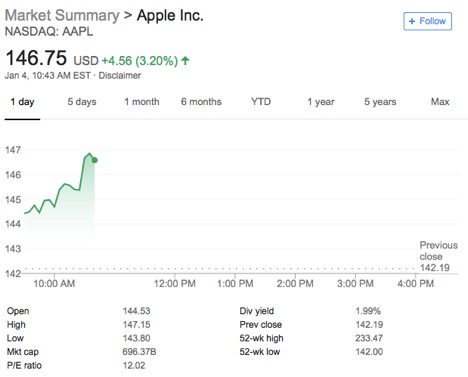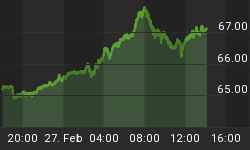When Apple lowered its first-quarter revenue guidance this week, it was partly because of a China slowdown, but that guidance has rippled through the market to affect anyone with heavy exposure to China.
China is buying fewer iPhones, and that news sent shockwaves through markets amid fears of an economic slowdown in the world’s second-biggest economy.
It didn’t help that Apple CEO Tim Cook talked about the potential “magnitude of the economic deterioration” in China.
Apple shares shed 10 percent on the news Thursday, the Dow lost 660 points and the S&P 500 index lost 2.5 percent.
In early morning trading Friday, it was up over 3 percent, paring some of those losses:

(Click to enlarge)
Some will argue that this is now a prime time to buy Apple on the cheap. True, Apple has lost $90 billion in market cap (36%) since it peaked in early October. But it all depends on how you see Apple going forward. If you’re obsessed with iPhone sales, you won’t see this is a buying opportunity. Related: How Big Data And A.I. Are Transforming The Energy Industry
What the opportunity-seekers see is something very different. They already know that the iPhone peaked, and while that was what catapulted Apple to Trillion-Dollar-Club fame, the real upside for this tech giant is the services business. We already knew there was going to be a major sales gap for iPhone in 2019.
JPMorgan called it back in October in a note to clients in which analyst Samik Chatterjee said: "Apple has historically been regarded as an IT Hardware company tied to a short product refresh cycle of the iPhone in an extremely competitive smartphone industry."
"More recently, investors have been proved wrong on the pace of Apple’s transformation to a services company, with revenues in the Services reporting segment increasing from 8% of total in FY12 to an estimated 20% of total in FY21E," he added.
Think: App Store, Apple Music and Apple Pay—not to mention its push into video and print media.
In fact, JPMorgan thinks we could see some new acquisitions by Apple in the near future. It’s also planning an “all-encompassing Media subscription”.
So, maybe a slowdown in Chinese purchases of iPhones isn’t what we should be focusing on, though everyone’s now running to Goldman Sachs’ list of the 20 companies with the biggest exposure to China.
Regardless of Apple’s position in the market, concerns of widespread losses due to what appears to be an economic slowdown in China are soaring.
“It’s not going to be just Apple,” Kevin Hassett, chairman of the White House Council of Economic Advisors, told CNN. “There are a heck of a lot of U.S. companies that have sales in China that are going to be watching their earnings being downgraded next year until we get a deal with China.”
Related: Morgan Stanley Predicts First Slump In Global Auto Sales In 10 Years
The Goldman list includes the Top 20 companies that get a large percentage of their sales from China and stand to take the biggest hit in the trade war.
Aside from Apple, which is No. 20 on the list and the least exposed, Goldman also includes tech company Skyworks Solutions as the most exposed at No. 1, and a lineup of chipmakers, from Intel (No. 16) and Micron (No. 6) to Qualcomm (No. 3) and Broadcom (No. 4), among others.
There’s some temporary relief—tongue in cheek—for news Friday that a new round of talks between the U.S. and China will take place in Beijing on January 7-8, though Chinese officials have confirmed and Washington has not.
By Michael Kern for Safehaven.com
More Top Reads From Safehaven.com
















